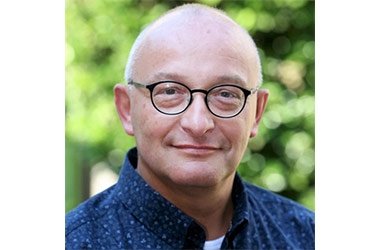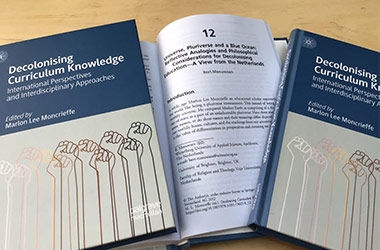Wittenborg Online News!
Decolonising Curriculum Knowledge Lecturer's Insight to Changing World Views
Decolonising Curriculum Knowledge Lecturer's Insight to Changing World Views
Decolonising Curriculum Knowledge Lecturer's Insight to Changing World Views
https://www.wittenborg.eu/decolonising-curriculum-knowledge-lecturers-insight-changing-world-views.htm
How expanding our scope of knowledge can change our way of lecturing
Wittenborg lecturer Bert Meeuwsen, is a well-known name within the business sector. For that reason, he was asked to write a chapter for the new book, Decolonising Curriculum Knowledge. In his chapter, “Universe, Pluriverse and a Blue Ocean: Reflective Analogies and Philosophical Considerations for Decolonising Education”, Meeuwsen describes how curriculum knowledge should be decolonised. Knowledge first available from indigenous peoples lost through colonisation and the imposition of Western, Eurocentric education and thinking can broaden our curriculum by adding it back to our frame of reference.
By combining this knowledge – derived from decolonising the current curriculum of business administration – an entirely new market is created operating around a different view of business principles. In his writings, Meeuwsen points to the Blue Ocean strategy, taken from the work of W. Chan Kim and Renée Mauborgne. The Blue Ocean business strategy is a way to discover new possibilities and opportunities within an inventive environment where there is little competition. Meeuwsen writes that by decolonising our curriculum, new opportunities emerge through the newly acquired knowledge. "To give just one example, many academic texts are written very factually, and are dryly passed onto the reader. I divided my chapter into little stories. Storytelling is an educational intervention that we are familiar with in education, but in some cultures much more than other cultures history is passed on through stories.” He continues, “I used the story as an example of looking at a text in a different way, dealing with a text in a different way quite creatively.”

Business anthropology
Meeuwsen became a lecturer at Wittenborg in 2016 after being asked to teach Cross Cultural Education and Consultancy. Before this, he had already had a long and successful career, with a wealth of experience that provided much insight into intercultural communication. With regard to his past career, Meeuwsen notes, "I noticed that conflicts regularly arose within intercultural working environments.” For example, he says, “When I still worked for a Swedish company about 30 years ago, there was a cross-cultural communication conflict between my employer and a Korean pharmacist.” He explains that in Swedish culture, people use more overt niceties to facilitate interactions. To contrast, in South Korean culture, it is considered more polite to keep communications as short and to the point as possible when the other person is a stranger. “I intervened as a mediator and explained to both parties that the communicative misunderstanding between the two parties was influenced by a difference of culture. And then the penny dropped for both of them," he says.
During this experience, Meeuwsen learned that business administration is a much broader field than just numbers and bullet points. It is also a field of work that involves social communication and considering the other person's insights. "In this case, I was a business anthropologist to bring two organisations together through two contacts that have to work intensively with each other in order to increase effectiveness commercially. That was the ultimate goal in the end. Was I doing marketing? Yes, but in a completely different field of work."
This understanding of other insights and looking through the eyes of the other person is crucial to his work at Wittenborg, where over 100 different nationalities work and learn together. In his time at Wittenborg, he saw the school go through many developments in this regard. "Over three years ago, Wittenborg introduced the three core values – Internationalisation, Ethics and Diversity – and linked that to contributing to creating a better world. Wittenborg's emphasis is on respecting and learning from everyone's world views and looking to each other's cultures to discover what connects us,” he explains.
"Wittenborg is like a family, and that sense of family ensures that faculty are open to teaching students something and vice versa students are eager to learn. Looking out for each other is elemental here and it must be, because otherwise you are just a number."
The launch for the book, Decolonising Curriculum Knowledge, will take place online on 18 November 14:00.
704 words